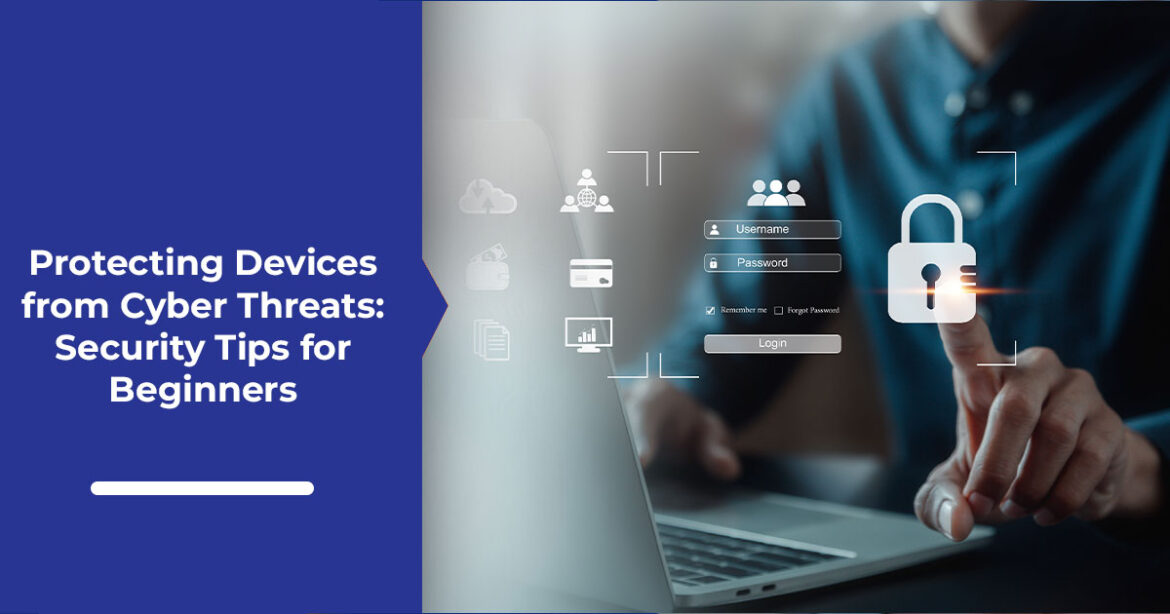In today’s digital world, our smartphones, laptops, and tablets store more personal data than ever before. From online banking and shopping to work files and private photos, everything lives in the digital space. However, with increasing convenience comes increasing vulnerability. Cyber threats such as malware, phishing, and ransomware can cause serious harm to both individuals and organizations.
For beginners, protecting devices from cyber threats may seem challenging. But with a few simple steps and the right tools like Norton 360, Bitdefender Total Security, McAfee, and Kaspersky anyone can secure their devices effectively. This article offers practical tips, easy security habits, and trusted tools to help beginners safeguard their devices, data, and privacy.
Understanding the Importance of Cybersecurity
Every device connected to the internet is a potential target. Hackers exploit weak passwords, outdated systems, and careless user behavior. Cybersecurity is no longer optional; it’s essential for everyone, regardless of technical expertise.
Modern security tools such as Norton 360 and Bitdefender Total Security act as digital bodyguards, protecting against viruses, identity theft, and malicious attacks. Even cloud platforms like Sync, IDrive, and Dropbox now emphasize encryption and secure sharing to keep files safe online.
1. Keep Software Updated
Outdated systems are easy prey for hackers. Regular updates fix security loopholes and improve performance. Always enable automatic updates for your operating system, apps, and browsers.
Tools like McAfee and Kaspersky can monitor for vulnerabilities and notify users when critical patches are available.
Table 1: Common Cyber Threats and Prevention Tips
| Cyber Threat | Description | How to Prevent It |
| Phishing | Fake emails or messages tricking users into revealing information | Avoid clicking unknown links; use email filters |
| Malware | Malicious software that damages or steals data | Use antivirus like Norton 360 or McAfee |
| Ransomware | Locks access to files until payment is made | Keep offline backups and use security tools |
| Spyware | Tracks user activity secretly | Regular scans with Bitdefender Total Security |
2. Use Trusted Antivirus and Security Suites
Reliable antivirus software forms the first line of defense. Comprehensive tools such as Norton 360, Bitdefender Total Security, McAfee, and Kaspersky provide real-time protection from malware, ransomware, and identity theft.
These suites offer much more than virus removal including VPNs, password managers, and parental controls. Beginners should install these from official websites to avoid counterfeit versions.
3. Strengthen Passwords and Use Multi-Factor Authentication
Passwords are often the weakest link. Avoid using birthdays, simple names, or repeated passwords. Instead, create strong passwords combining letters, numbers, and special symbols.
Password managers included in Norton 360 or Bitdefender Total Security simplify this process. Enabling multi-factor authentication (MFA) adds another layer of safety by verifying identity through SMS, email, or biometrics.
4. Secure Cloud Backups
Backing up data is essential for digital safety. Cloud services like Sync, IDrive, and Dropbox offer encrypted storage, automatic backups, and easy access from any device.
These platforms help recover files after system crashes, theft, or ransomware attacks. Always activate encryption and use strong passwords for your cloud accounts.
5. Avoid Public Wi-Fi Risks
Public Wi-Fi in cafes or airports can be dangerous. Hackers often intercept data from unsecured networks. Avoid logging into sensitive accounts while on public Wi-Fi.
Using a VPN (available in tools like Norton 360 or Kaspersky) encrypts your data and prevents spying.
6. Recognize Phishing and Social Engineering
Phishing emails or fake websites trick users into revealing information. Always verify the sender, check URLs carefully, and avoid clicking on suspicious links.
Security software like Bitdefender Total Security and McAfee includes anti-phishing tools that block deceptive websites automatically.
7. Manage App and Device Permissions
Many apps collect unnecessary data. Review permissions regularly and disable access to your microphone, camera, or location when not needed.
Tools like Kaspersky or Norton 360 include privacy dashboards showing which apps may be spying on your activity.
8. Enable Device Tracking and Remote Wipe
If a device is lost or stolen, tracking features can help recover it or erase sensitive data. Both McAfee and Bitdefender Total Security have remote wipe functions to protect your information even after loss.
Beginners should enable these settings during initial device setup.
9. Back Up Important Data Regularly
Backups protect you from unexpected disasters like ransomware or accidental deletions. A combination of offline (external drives) and online (cloud) backups ensures complete protection.
Services like IDrive, Sync, and Dropbox make it easy to automate backups securely.
Table 2: Comparison of Popular Cybersecurity Tools
| Tool | Main Features | Best For |
| Norton 360 | Real-time protection, VPN, password manager, cloud backup | All-round digital protection |
| Bitdefender Total Security | Multi-device support, anti-phishing, performance optimization | Families and professionals |
| McAfee | Identity theft protection, firewall, remote device lock | Personal and small business use |
| Kaspersky | Malware removal, privacy monitoring, secure browsing | Everyday users and students |
| IDrive | Automatic backups, file versioning, multi-device sync | Backup across multiple devices |
10. Stay Alert and Educated
Cyber threats are constantly evolving. The best protection is awareness. Beginners should follow tech blogs, cybersecurity news, and tutorials to stay updated about new scams or vulnerabilities.
Practicing safe habits like verifying websites, avoiding pirated software, and scanning external drives helps prevent most attacks.
Conclusion
Protecting devices from cyber threats doesn’t require advanced technical skills, just awareness, consistency, and the right tools. Security solutions like Norton 360, Bitdefender Total Security, McAfee, and Kaspersky provide robust defense against modern online dangers.
For additional safety, users should rely on cloud backup platforms like Sync, IDrive, and Dropbox to secure important data and enable recovery after attacks.
Ultimately, cybersecurity is an ongoing habit. Staying informed, updating software, and backing up regularly can make all the difference. In a connected world, being proactive is the best protection against ever-evolving digital threats.

